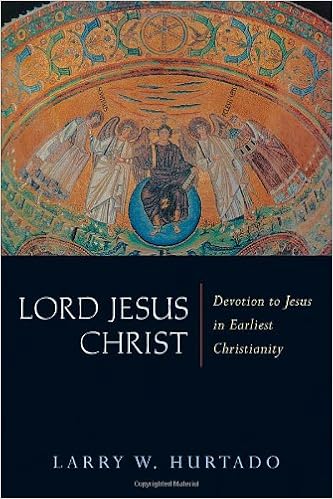VISIONS OF THE exalted Christ, prophetic oracles, inspired songs and charismatic exegesis of biblical texts - these comprise perhaps the primary examples of the validating religious experiences of the earliest circles of Christianity.
Yesterday we saw how these experiences would have provided the necessary "furnace" to enable and demand that a serious reconfiguration of the existing Jewish devotional matrix be undertaken. Today, then, we can enumerate these various sorts of religious experience.
1. Visions - I note with interest Hurtado's openness to the centrality of the Spirit via his referencing here of 1 Cor. 14:26, which is most powerfully manifest in a collective setting. Think about it: in these revelations, the Spirit is pivotal to making the resurrected Son central alongside the Father.
2. Prophetic oracles and inspired songs - again this is not every lone Christian experience, but a feature of the shared experience of the group. Interestingly, we have access to some of the productions of this period through some of Paul's citations of hymns known to his recipients (e.g. Phil. 2:6-11). There was no literary brilliance involved either: These were not the products of trained poets but arose out of the religious exaltation of Christians (p. 73).
3. "Charismatic exegesis" - it is interesting to reflect on the very real possibility that Hurtado provides us that integrating a revisitation of the Old Testament texts (also considered to be inspired by the Holy Spirit) could be part of this communal furnace experience. We can tend to associate analysis of biblical texts as a serious and considered preoccupation that is available to a few from the pulpit and the rest of us at home (in light of that pulpit). Not so the first Christians! In particular, Hurtado shows some legitimate wonder at the usage of the highly monotheistic text of Isaiah 45:23 in Philippians 2:10-11, where Christ gets to be Kyrios in this Old Testament passage!
In addition to these aspects, Hurtado also considers that prayer for divine revelations would have featured, and indeed invigorated fresh inquiry into their Jewish scriptures.
It is this highly experiential life and breath understood through the lens of the Spirit that would have permitted such rapid and intense proportions of Jesus devotion to occur. For me, that might make three, even or perhaps particularly in the context of worship.
Come back tomorrow for Part 13: The Religious Environment, which will see us complete the four factors Hurtado provides for the emergence and shape of Christian devotion to Jesus in the first century. Before I go - ever so grateful to Dr. Hurtado for recommending this series on his own blog, I hope any newcomers from there are enjoying the style and approach I've adopted. We are not too far now from the end of chapter 1, at which point I will provide a summary with Hurtado's chapter structure and my corresponding posts for ease of access.
Yesterday we saw how these experiences would have provided the necessary "furnace" to enable and demand that a serious reconfiguration of the existing Jewish devotional matrix be undertaken. Today, then, we can enumerate these various sorts of religious experience.
1. Visions - I note with interest Hurtado's openness to the centrality of the Spirit via his referencing here of 1 Cor. 14:26, which is most powerfully manifest in a collective setting. Think about it: in these revelations, the Spirit is pivotal to making the resurrected Son central alongside the Father.
2. Prophetic oracles and inspired songs - again this is not every lone Christian experience, but a feature of the shared experience of the group. Interestingly, we have access to some of the productions of this period through some of Paul's citations of hymns known to his recipients (e.g. Phil. 2:6-11). There was no literary brilliance involved either: These were not the products of trained poets but arose out of the religious exaltation of Christians (p. 73).
3. "Charismatic exegesis" - it is interesting to reflect on the very real possibility that Hurtado provides us that integrating a revisitation of the Old Testament texts (also considered to be inspired by the Holy Spirit) could be part of this communal furnace experience. We can tend to associate analysis of biblical texts as a serious and considered preoccupation that is available to a few from the pulpit and the rest of us at home (in light of that pulpit). Not so the first Christians! In particular, Hurtado shows some legitimate wonder at the usage of the highly monotheistic text of Isaiah 45:23 in Philippians 2:10-11, where Christ gets to be Kyrios in this Old Testament passage!
In addition to these aspects, Hurtado also considers that prayer for divine revelations would have featured, and indeed invigorated fresh inquiry into their Jewish scriptures.
It is this highly experiential life and breath understood through the lens of the Spirit that would have permitted such rapid and intense proportions of Jesus devotion to occur. For me, that might make three, even or perhaps particularly in the context of worship.
Come back tomorrow for Part 13: The Religious Environment, which will see us complete the four factors Hurtado provides for the emergence and shape of Christian devotion to Jesus in the first century. Before I go - ever so grateful to Dr. Hurtado for recommending this series on his own blog, I hope any newcomers from there are enjoying the style and approach I've adopted. We are not too far now from the end of chapter 1, at which point I will provide a summary with Hurtado's chapter structure and my corresponding posts for ease of access.



